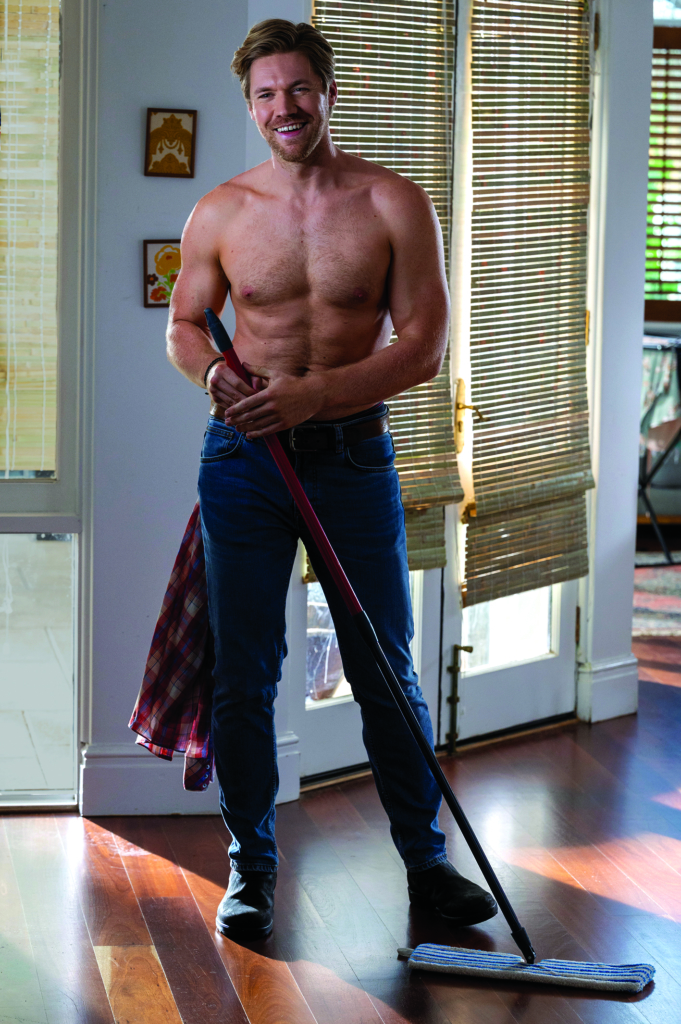Renée Webster’s romantic comedy How to Please a Woman (2022) begins by immersing the viewer, literally, in rolling waves of pleasure. The camera cruises beneath the teal-tinted dawn surface of the ocean off Leighton Beach, Fremantle. We’re buoyed up by the swell, then plunged beneath each breaking wave.
Women’s swimming bodies share the screen space; it’s their exhilaration we’re experiencing by proxy. Practised elbows and hands surface to carve the water; strong legs and feet kick and churn; brightly coloured bathing caps, goggles and swimsuits gleam like selkies’ pelts. The camera rises to an overhead view of the swimmers in a loose formation: a school of purposeful women heading in the same direction.
Then a quick cut introduces us to Gina (Sally Phillips), who’s smiling blissfully under a hot shower after her ocean swim with her friends. We meet them in the change rooms, gossiping as they put away their selkie skins and groom themselves for their everyday lives among men.

This is a tantalisingly allegorical way to begin a story about how this group of women will reclaim their pleasure, pushing back on patriarchal attempts to steal it. In Celtic and Norse folklore, selkies are large seals that can shapeshift to human form by shedding their skins. According to North Sea tales from Orkney, Shetland and the Faroe Islands, a man can make a selkie his wife if he confiscates her sealskin so she cannot swim away. But she will always long for her true home, and the moment she finds her hidden skin, she will abandon her human husband and children. Male selkies, on the other hand, are described as incredibly handsome and attentive; they seek out and seduce neglected fishermen’s wives.[1]See Walter Traill Dennison, ‘Orkney Folk-Lore’, The Scottish Antiquary; or, Northern Notes and Queries, vol. 7, no. 29, T. and A. Constable, Edinburgh, 1893, pp. 171–7.
By the end of this film, Gina and her friends will reclaim themselves as whole people, content in their skins. And they’ll do it by running a ‘housecleaning’ business that sends sleek, handsome male strangers to provide ‘full service’ to lonely, unsatisfied women in their seaside suburb. Frustratingly, however, How to Please a Woman never quite delivers on the transformative potential of its opening moments. While it returns to aquatic motifs at certain junctures, the film settles into a realist comedy-drama about amateurs who dabble around the edges of the sex industry for their own self-actualisation.
It’s a film full of escapist fantasy – but of the dispiriting variety that, in Australia, has been called ‘aspirational’.[2]The concept of ‘aspiration’ took hold of Australian political discourse in the early 2000s, when then–prime minister John Howard deployed ‘aspirational’ as a flattering term for the neoliberal concept that individual striving within a free market creates upward social mobility, while his opponent in the 2004 federal election, Mark Latham, also unsuccessfully attempted to woo ‘aspirational’ voters by realigning the Australian Labor Party with free-market economics. In the ensuing two decades, the centre-right Liberal–National Coalition has monopolised ‘aspiration’ in the political arena, while ideas of government-regulated ‘fairness’ have become electorally unpalatable. See Haydon Manning, ‘“Aspirational Voters” and the 2004 Federal Election’, Australian Review of Public Affairs, 4 July 2005 <http://www.australianreview.net/digest/2005/07/manning.html>; and Mark Triffitt, ‘Voter Aspiration Delivers for Coalition’, Pursuit, 20 May 2019, <https://pursuit.unimelb.edu.au/articles/voter-aspiration-delivers-for-coalition>, both accessed 30 May 2022. In How to Please a Woman, running a small business is shown to be not only the key to self-fulfilment, but also a way to find love and consolidate friendship. The film betrays a troubling lack of distinction between labour and leisure, and between financial transactions and acts of care and solidarity. When pleasure is work, you never get to clock off.

Supply and demand
The film begins on Gina’s fiftieth birthday. She and her lawyer husband, Adrian (Cameron Daddo), are empty-nesters; their only daughter, Chloe (Asher Yasbincek), is studying in London. Their marriage is companionable but distant, which suits Adrian but disappoints Gina.
She’s similarly overlooked at her administration job for an insolvency firm, where her crass boss Brett (Oliver Wenn) prefers to leer at a young, blonde, well-endowed worker named Alice (Emily Rose Brennan). Despite having requested a half-day off, Gina is instead sent on an errand by Brett to retrieve a document left behind at Pleased to Move You, a removalist company run – badly – by Steve (Erik Thomson).
Gina is established as someone who yearns for intimacy but denies herself pleasure. She’s embarrassed when her friend Hayley (Hayley McElhinney) gives her a remote-controlled sex toy. And she refuses Steve’s home-baked gingersnaps, muttering that she’s on a portion-controlled, meal-in-a-box diet. ‘You don’t know what you’re missing out on,’ Steve’s employee Anthony (Ryan Johnson) observes, unsubtly.
Later, she’s interrupted from some joyless birthday housework when a gorgeous young man, Tom (Alexander England), knocks on her door and begins to strip seductively on her verandah. Naturally, Gina is mortified; as she ushers him inside away from gawking neighbours, he explains that he’s her birthday gift. Her friends have booked him for two hours, during which time he’ll do anything she wants. ‘Anything?’ Gina asks, an idea brewing. ‘Do you think you could clean my house?’

Desultorily, as if he’s never handled a broom before, Tom starts to sweep the floor as a limp cover version of the R’n’B sex-jam song ‘Pony’ plays. This song choice, and the banality with which the scene is staged, reveals the disappointing blandness of this film’s erotic imagination. The original version of ‘Pony’, by US artist Ginuwine, was memorably the signature song of Channing Tatum’s titular stripper character in Magic Mike (Steven Soderbergh, 2012), his pelvic thrusts synchronised lewdly with the song’s vocoder-like synth bass as he humped the stage.
The effect here is meant to be ironic, of course. Tom is cute in an everyday Aussie way, but he’s no Magic Mike; he doesn’t know how to offer his body to the female gaze. But, irritatingly, Gina does seem to see sexy potential in Tom’s floor routine; as she continues her ironing, her eyes follow his movements and clouds of steam mimetically express her feelings.
Her thoughts turn to Steve’s failing removalist company, and she offers a proposal: they can avoid insolvency by pivoting to a shirtless cleaning service. When Brett abruptly makes Gina redundant, she decides to run Pleased to Move You herself, and advertises their services to her swimming friends via a flyer in the beach changing room.
The film betrays a troubling lack of distinction between labour and leisure, and between financial transactions and acts of care and solidarity.
Claudia (Roz Hammond) is Tom’s first cleaning client, but they end up having sex, much to Gina’s horror. She scolds Tom for his unprofessionalism, but a thrilled Claudia is already spreading word that ‘the cleaning is just a cover-up’. Although other women are now fighting to secure bookings, the very thought of trading in sex has Gina spiralling.
‘This is a very good idea; you’re being so uptight!’ Hayley chides. Reluctantly, Gina agrees. She refines the company’s systems, trains up the former removalists and discreetly takes bookings from her parked car at the beach. These vignette scenes in which women tell Gina their sexual requirements are played as comedy; but they also prompt her at last to consider her own desires.
But when a reinvigorated Gina tries to seduce Adrian – mood music; enigmatically instructional notes; chilled white wine; a trail of rose petals leading to the bedroom – he warily hands her a glass of wine and stalks away. She tries to outswim her sorrow in the ocean, but the breakthrough comes, finally, when she’s alone in the company warehouse and decides to try out her remote-controlled sex toy.
However, Steve’s unexpected arrival interrupts Gina’s masturbation session. Flustered, she drops her remote, which Steve innocently pockets. He then takes to his exercise bike while chatting to Gina, who struggles to keep her cool as Steve’s pumping legs manipulate the vibrator. When Steve notices the toy’s nearby packaging, he twigs to what’s happening, and what began as a comic set piece becomes a more earnest remote-controlled love scene.

Capital and community
Writer/director Webster based How to Please a Woman’s story on a real Australian company that offered sexual services exclusively to heterosexual women:
The women who ran the company described themselves as housewives, and I was just really interested in how we have these preconceptions about the sex industry and who would be involved. I read everything I possibly could about them, and then I got in touch with them. What I wanted to find out about was why did they choose to offer that service and who were the clients. […] It’s a big deal if you make that choice.[3]Renée Webster, quoted in Peter Gray, ‘Interview: Director Renée Webster on How to Please a Woman and Finding the Comedy in Truth and Pain’, the AU review, 10 May 2022, <https://www.theaureview.com/watch/interview-director-renee-webster-on-how-to-please-a-woman-and-finding-the-comedy-in-truth-and-pain/>, accessed 28 May 2022.
But Webster’s film ultimately feels flippant. Bathed in Fremantle’s mild golden sunlight, it seems to take place in a cosy fantasy bubble. And while Magic Mike, set in a similarly sun-drenched Florida, distinguishes between the sublime female-gaze fantasies the dancers serve on stage and the precarious working-class lives they’re striving to transcend, there’s little sense of genuine physical, legal or financial risk for anyone in How to Please a Woman.
Tatum’s Mike is aspirational in the neoliberal sense: he yearns to run his own business making custom furniture. Soderbergh offers a pointed moment in which Mike tries to secure a bank loan, wearing his most respectable suit and offering as a deposit the smoothed-out small bills that audiences have stuffed into his G-string. Instead, he’s humiliated. Mike’s stage charisma can’t be converted into capital. His play money’s no good here.

There’s nothing so gritty in How to Please a Woman, whose ‘real-world’ mise en scène is its actual fantasy terrain, while its sex acts are prosaic in a way that undercuts their eroticism. Its humour springs from the characters’ ordinariness, which makes their sex work seem incongruous.
In this way, How to Please a Woman resembles the UK comedies The Full Monty (Peter Cattaneo, 1997), in which unemployed Sheffield steelworkers reinvent themselves as unlikely strippers willing to go completely nude, and Calendar Girls (Nigel Cole, 2003), in which middle-aged Yorkshire women pose for a nude calendar to raise funds for leukaemia research. The comedy in these films depends on the protagonists’ respectability – the insistence that they don’t usually do this sort of thing. And because they’re amateurs, their erotic labour is treated as play, not as real work.
Ostensibly, Webster seeks to indulge her female viewers’ fantasy of simultaneously outsourcing domestic drudgery and indulging their sexual appetites. But the female characters do the work here.
The casting of English actor Phillips here seems calculated to recall this particular strand of cinema. While she essays a decent Australian accent – albeit of the Anglophilic Perth variety – audiences are likely to know her from the 1990s UK comedy scene, where she co-created the female-focused sketch-comedy series Smack the Pony. She’s perhaps best known for her supporting role in the Bridget Jones films[4]Bridget Jones’s Diary (Sharon Maguire, 2001), Bridget Jones: The Edge of Reason (Beeban Kidron, 2004) and Bridget Jones’s Baby (Maguire, 2016). as Shazza, Bridget’s (Renée Zellweger) foul-mouthed but loyal best friend.
Apart from a brief scene in which Steve and his employees discuss whether they’re willing to have sex for money, this film is strikingly uninterested in treating them as workers. Indeed, Tom and Steve are the only male characters who are really granted inner lives. We see Tom trying to prove to his pregnant ex-girlfriend that he’ll be a good dad; meanwhile, Steve fears that his plump cook’s body won’t please women … especially Gina.

The third and least conventionally handsome removalist, a genial Kiwi named Ben (Josh Thomson), isn’t really treated as a sexual being at all. His only stripping scene – in which Adrian hires him to clean their home, believing Ben to be a regular cleaner – is played purely for laughs. And the film also has little sympathy for Adrian, who turns out to be asexual, or close to it. He’s not bored or unfaithful in his marriage; he simply doesn’t want sex.
Ostensibly, Webster seeks to indulge her female viewers’ fantasy of simultaneously outsourcing domestic drudgery and indulging their sexual appetites. But the female characters do the work here, even though they’re the clients. For instance, Alice, Gina’s busty former co-worker, contacts Pleased to Move You to buy sex, and ends up offering her IT skills to debug the company’s ancient website.
In one infuriating scene, corporate lawyer Monique (Tasma Walton) teaches the hapless Tom how to scrub her bathtub. In the real world, Monique might be angry that she’s not only paid the cleaner but also actually helped him to do his work. But because this is the blandest of fantasy worlds, her steamy time with Tom instead emboldens her to initiate sex with her surgeon husband, Richard (Myles Pollard).
In reality, it would be an appalling conflict of interest that Gina’s core clientele – who also, apparently, collectively double as the company’s HR department – are her friends. Sandra (Caroline Brazier) flags that while Tom is fantastic in bed, his cleaning skills are terrible. Pamela (Alexandria Steffenson) books Anthony, but delivers a negative performance evaluation of his self-centred sexual technique. Once more, sex-positive Hayley helps out: in one of the film’s most sensuous scenes, she helps Anthony unlearn his bad habits and focus on being present with his lover. Hayley even agrees to service Fiona (Catherine Moore), a client from their swimming group who has requested sex with another woman.

This isn’t sex work. It’s more like a polycule: a group of bourgeois friends all having sex with the same few men, with one another’s knowledge and consent. Money is never shown changing hands. Indeed, there’s a particularly fantastical scene in which all the main male and female characters gather to socialise on a pier. They laugh together, eat and drink, and leap joyfully into the water.
Even though Gina is running an unlicensed business in a highly regulated and criminalised industry, police attention is never truly a threat. In one scene, a cop (Dan Paris) unsettles the team by swaggering into the warehouse, only for his uniform to be revealed as a tearaway costume; he’s auditioning to work there.
Late in the film, Gina really is arrested, but spends her police interview grandstanding about orgasms while a throng of uniformed female police officers watch avidly behind a two-way mirror, smirking and passing around a packet of biscuits. While she is threatened with a five-figure fine, the film treats this as a moment of reckoning for Gina’s marriage, not for her business. Adrian initially acts as her lawyer, but Gina finally has the courage to stand up to him, ending their marriage and leaving herself free to pursue not only her company, but also a relationship with Steve, who now monetises his non-sexual skills from a popular beachside bakery kiosk.
What makes How to Please a Woman an aspirational fantasy is that it treats running a business as a means to achieve friendship, community and even sexual fulfilment. As the film ends, Gina sits on the beach with Hayley, Monique and Sandra, watching job orders roll in on the company’s new private site and laughing delightedly. They don’t don their swimsuits and dive into the ocean. They no longer need to. They’re businesswomen now, and they’re very pleased with themselves.
Endnotes
| 1 | See Walter Traill Dennison, ‘Orkney Folk-Lore’, The Scottish Antiquary; or, Northern Notes and Queries, vol. 7, no. 29, T. and A. Constable, Edinburgh, 1893, pp. 171–7. |
|---|---|
| 2 | The concept of ‘aspiration’ took hold of Australian political discourse in the early 2000s, when then–prime minister John Howard deployed ‘aspirational’ as a flattering term for the neoliberal concept that individual striving within a free market creates upward social mobility, while his opponent in the 2004 federal election, Mark Latham, also unsuccessfully attempted to woo ‘aspirational’ voters by realigning the Australian Labor Party with free-market economics. In the ensuing two decades, the centre-right Liberal–National Coalition has monopolised ‘aspiration’ in the political arena, while ideas of government-regulated ‘fairness’ have become electorally unpalatable. See Haydon Manning, ‘“Aspirational Voters” and the 2004 Federal Election’, Australian Review of Public Affairs, 4 July 2005 <http://www.australianreview.net/digest/2005/07/manning.html>; and Mark Triffitt, ‘Voter Aspiration Delivers for Coalition’, Pursuit, 20 May 2019, <https://pursuit.unimelb.edu.au/articles/voter-aspiration-delivers-for-coalition>, both accessed 30 May 2022. |
| 3 | Renée Webster, quoted in Peter Gray, ‘Interview: Director Renée Webster on How to Please a Woman and Finding the Comedy in Truth and Pain’, the AU review, 10 May 2022, <https://www.theaureview.com/watch/interview-director-renee-webster-on-how-to-please-a-woman-and-finding-the-comedy-in-truth-and-pain/>, accessed 28 May 2022. |
| 4 | Bridget Jones’s Diary (Sharon Maguire, 2001), Bridget Jones: The Edge of Reason (Beeban Kidron, 2004) and Bridget Jones’s Baby (Maguire, 2016). |





